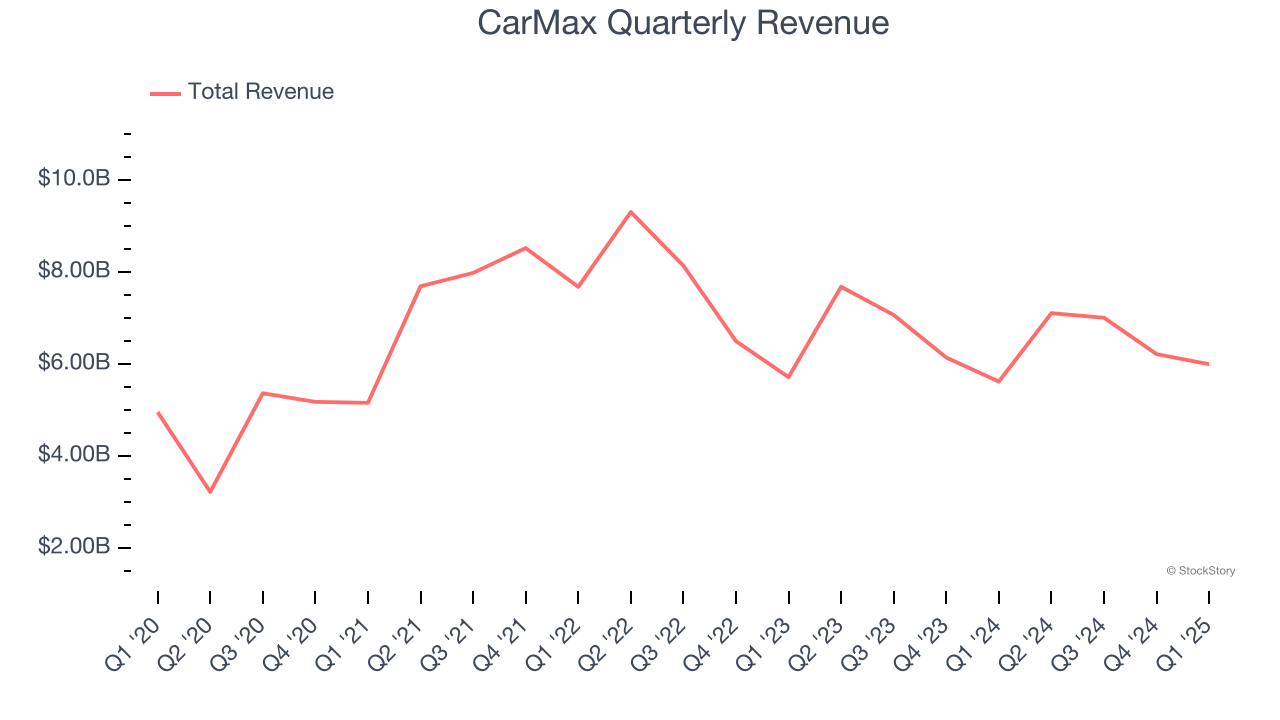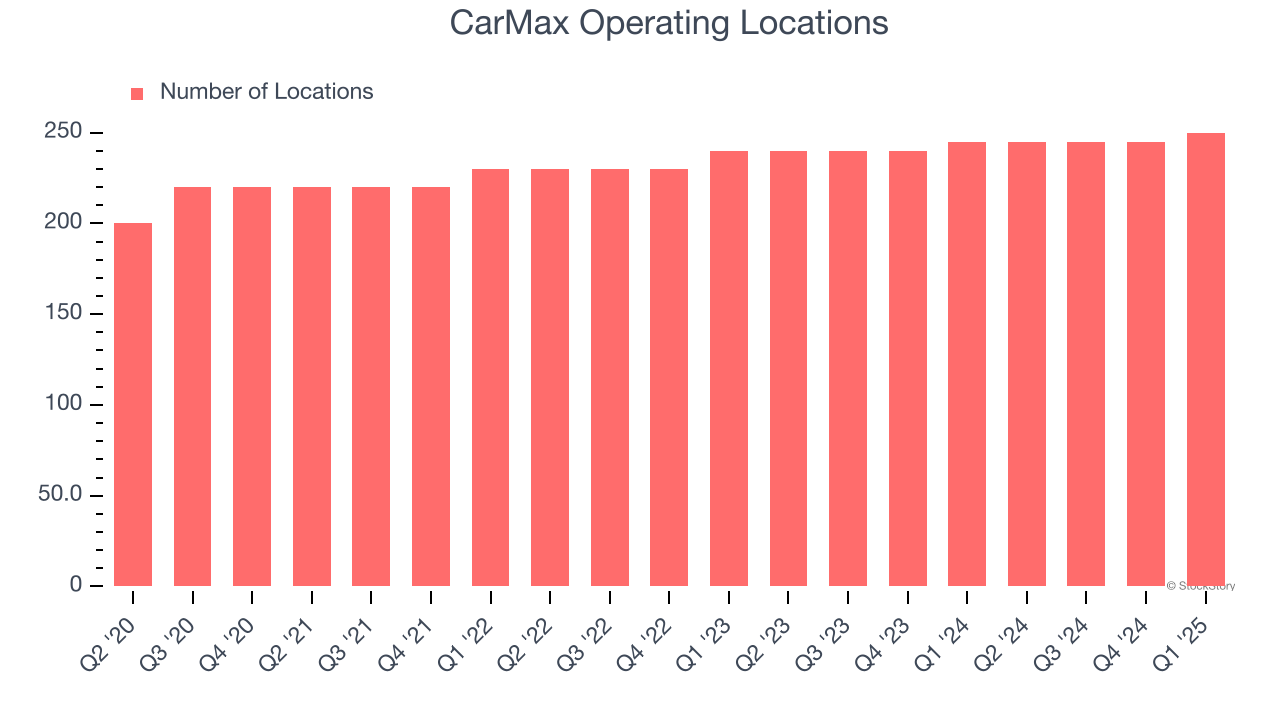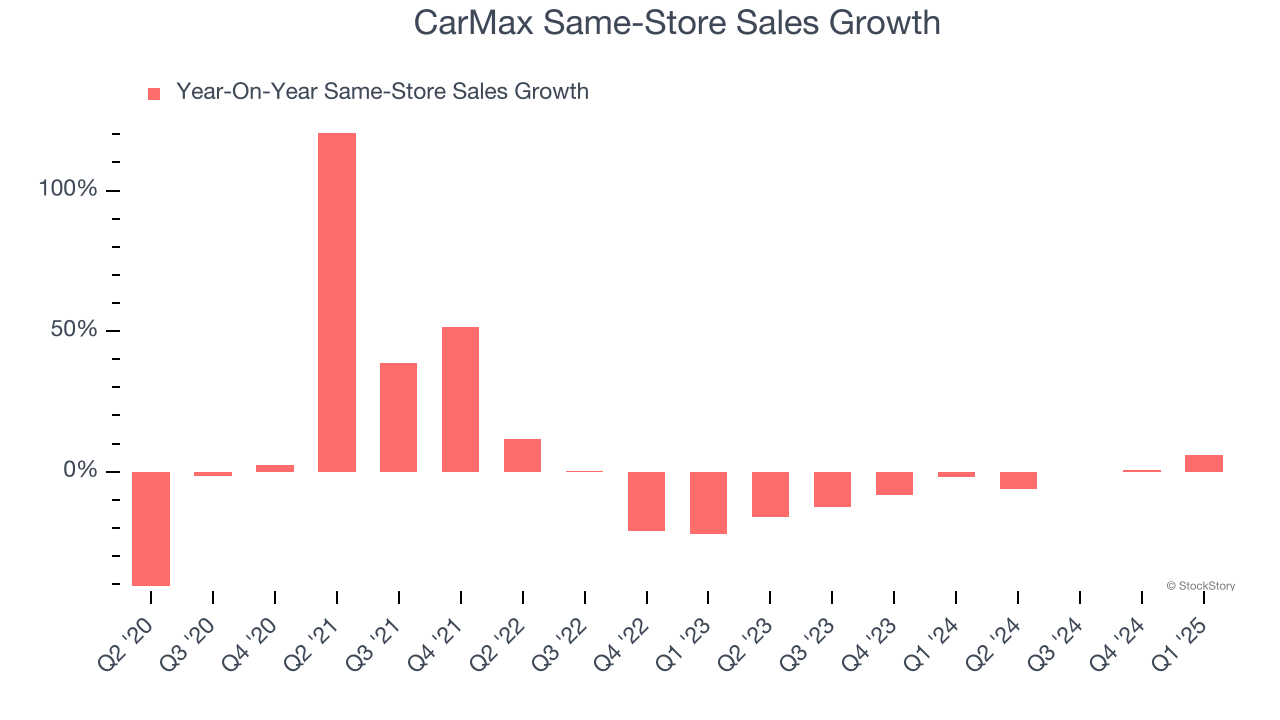
Used automotive vehicle retailer Carmax (NYSE: KMX) met Wall Street’s revenue expectations in Q1 CY2025, with sales up 6.7% year on year to $6.00 billion. Its GAAP profit of $0.58 per share was 11.9% below analysts’ consensus estimates.
Is now the time to buy CarMax? Find out by accessing our full research report, it’s free.
CarMax (KMX) Q1 CY2025 Highlights:
- Revenue: $6.00 billion vs analyst estimates of $5.99 billion (6.7% year-on-year growth, in line)
- EPS (GAAP): $0.58 vs analyst expectations of $0.66 (11.9% miss)
- Adjusted EBITDA: $150 million vs analyst estimates of $228.7 million (2.5% margin, 34.4% miss)
- Operating Margin: 1%, in line with the same quarter last year
- Free Cash Flow Margin: 0.3%, down from 3.6% in the same quarter last year
- Locations: 250 at quarter end, up from 245 in the same quarter last year
- Same-Store Sales rose 5.9% year on year (-2% in the same quarter last year)
- Market Capitalization: $12.31 billion
“We are pleased with the continuing momentum across our diversified business during the fourth quarter. We delivered robust EPS growth driven by increases in unit sales and buys, strong growth in total gross profit, an increase in CAF income, and ongoing management of SG&A,” said Bill Nash, president and chief executive officer.
Company Overview
Known for its transparent, customer-centric approach and wide selection of vehicles, Carmax (NYSE: KMX) is the largest automotive retailer in the United States.
Vehicle Retailer
Buying a vehicle is a big decision and usually the second-largest purchase behind a home for many people, so retailers that sell new and used cars try to offer selection, convenience, and customer service to shoppers. While there is online competition, especially for research and discovery, the vehicle sales market is still very fragmented and localized given the magnitude of the purchase and the logistical costs associated with moving cars over long distances. At the end of the day, a large swath of the population relies on cars to get from point A to point B, and vehicle sellers are acutely aware of this need.
Sales Growth
Reviewing a company’s long-term sales performance reveals insights into its quality. Any business can put up a good quarter or two, but the best consistently grow over the long haul.
With $26.35 billion in revenue over the past 12 months, CarMax is one of the larger companies in the consumer retail industry and benefits from a well-known brand that influences purchasing decisions. However, its scale is a double-edged sword because there are only a finite number of places to build new stores, making it harder to find incremental growth. To expand meaningfully, CarMax likely needs to tweak its prices or enter new markets.
As you can see below, CarMax’s sales grew at a tepid 6.4% compounded annual growth rate over the last six years (we compare to 2019 to normalize for COVID-19 impacts).

This quarter, CarMax grew its revenue by 6.7% year on year, and its $6.00 billion of revenue was in line with Wall Street’s estimates.
Looking ahead, sell-side analysts expect revenue to grow 4.9% over the next 12 months, a slight deceleration versus the last six years. We still think its growth trajectory is attractive given its scale and suggests the market is baking in success for its products.
Here at StockStory, we certainly understand the potential of thematic investing. Diverse winners from Microsoft (MSFT) to Alphabet (GOOG), Coca-Cola (KO) to Monster Beverage (MNST) could all have been identified as promising growth stories with a megatrend driving the growth. So, in that spirit, we’ve identified a relatively under-the-radar profitable growth stock benefiting from the rise of AI, available to you FREE via this link.
Store Performance
Number of Stores
CarMax sported 250 locations in the latest quarter. Over the last two years, it has opened new stores quickly, averaging 2.9% annual growth. This was faster than the broader consumer retail sector.
When a retailer opens new stores, it usually means it’s investing for growth because demand is greater than supply, especially in areas where consumers may not have a store within reasonable driving distance.

Same-Store Sales
The change in a company's store base only tells one side of the story. The other is the performance of its existing locations and e-commerce sales, which informs management teams whether they should expand or downsize their physical footprints. Same-store sales is an industry measure of whether revenue is growing at those existing stores and is driven by customer visits (often called traffic) and the average spending per customer (ticket).
CarMax’s demand has been shrinking over the last two years as its same-store sales have averaged 4.9% annual declines. This performance is concerning - it shows CarMax artificially boosts its revenue by building new stores. We’d like to see a company’s same-store sales rise before it takes on the costly, capital-intensive endeavor of expanding its store base.

In the latest quarter, CarMax’s same-store sales rose 5.9% year on year. This growth was a well-appreciated turnaround from its historical levels, showing the business is regaining momentum.
Key Takeaways from CarMax’s Q1 Results
We struggled to find many positives in these results. Its EBITDA missed significantly and its EPS fell short of Wall Street’s estimates. Overall, this quarter could have been better. The stock traded down 7.1% to $74.45 immediately following the results.
CarMax didn’t show it’s best hand this quarter, but does that create an opportunity to buy the stock right now? What happened in the latest quarter matters, but not as much as longer-term business quality and valuation, when deciding whether to invest in this stock. We cover that in our actionable full research report which you can read here, it’s free.



